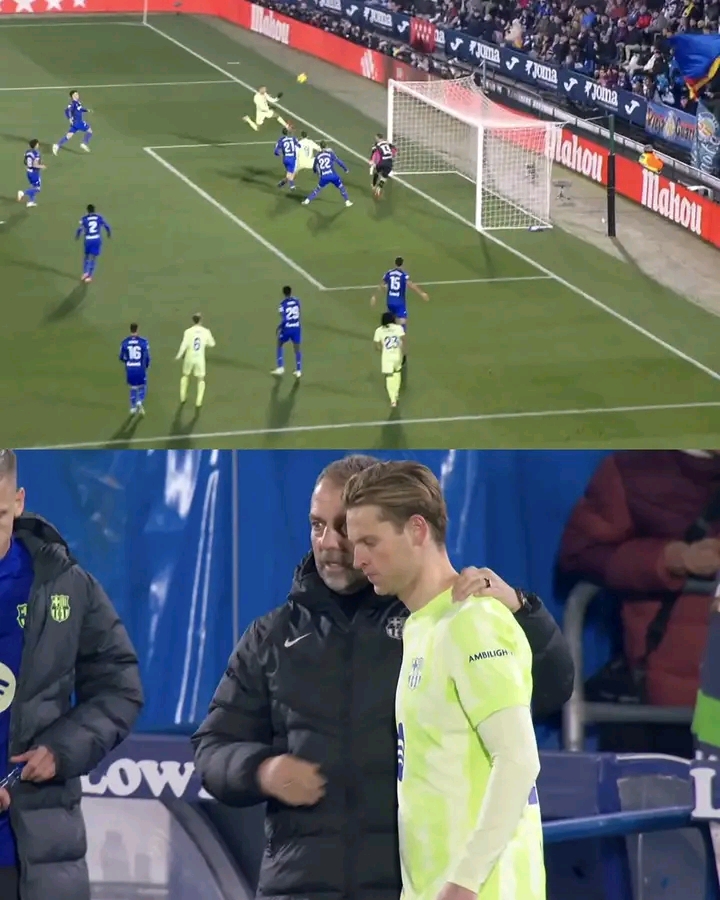Sport
Hansi Flick is bringing on Frenkie de Jong at halftime. He replaces Casado.

The tension was palpable at halftime, as Real Madrid’s manager, Hansi Flick, decided to make a bold and tactical change. Frenkie de Jong, the midfield maestro, was summoned to replace the young talent Casado. This decision carried weight, signaling a shift in Flick’s strategy as he looked to turn the tide in a crucial match.
A Calculated Decision by Flick
Bringing on a player of Frenkie de Jong’s caliber at halftime was more than just a substitution; it was a statement of intent. Flick, renowned for his tactical acumen, recognized the need to introduce stability and creativity in the midfield to regain control of the game.
Casado’s Early Contributions
Though Casado had shown promise during the first half, the pace and intensity of the game demanded an experienced presence. Flick’s decision was less a critique of Casado’s performance and more a recognition of the high stakes involved in the match.
The Frenkie Factor
De Jong’s entry was greeted with anticipation. Known for his exceptional ball control, vision, and ability to dictate the tempo, he was precisely the kind of player Real Madrid needed to navigate the challenges posed by their opponents.
A Midfield Maestro in Action
As soon as De Jong stepped onto the pitch, his impact was evident. He brought a sense of calm to Real Madrid’s midfield, seamlessly connecting defense and attack. His ability to evade pressing opponents and find pockets of space turned the tide in Real’s favor.
Hansi Flick’s Tactical Mastery
Flick’s substitution highlighted his ability to read the game and make decisive changes at critical moments. By bringing on De Jong, he not only strengthened the midfield but also sent a clear message to his players: adapt, evolve, and seize control.
Real Madrid’s Renewed Dominance
With De Jong orchestrating from the center, Real Madrid began to dominate possession. Their passes became more fluid, their transitions smoother, and their attacking moves more cohesive. The substitution breathed new life into the team.
The Dutchman’s Leadership
De Jong’s presence didn’t just elevate the team tactically; it also boosted morale. His leadership qualities, honed during his time at Barcelona and with the Dutch national team, inspired those around him to step up their game.
Casado’s Learning Curve
For Casado, being replaced at halftime was a learning moment. The young talent had the opportunity to observe De Jong’s masterclass from the sidelines, gaining valuable insights into the demands of top-tier football.
A Statement of Intent
This substitution wasn’t just about the match at hand. Flick’s decision to rely on De Jong underscored his commitment to building a team capable of adapting and thriving under pressure, a quality essential for Real Madrid’s long-term success.
The Crowd’s Reaction
Fans in the stadium erupted with applause as De Jong took the field. His reputation as a game-changer preceded him, and the supporters knew that his introduction could be the turning point in the match.
De Jong’s Role in the Bigger Picture
While this match was a key moment, it also highlighted De Jong’s growing importance within Flick’s system. The Dutchman has gradually become a pivotal figure in Real Madrid’s midfield, earning the trust of his manager and teammates alike.
Hansi Flick’s Vision
Flick’s tenure at Real Madrid has been marked by bold decisions and a clear vision for the team’s future. His willingness to make impactful substitutions, even involving high-profile players, is a testament to his commitment to excellence.
A Turning Point in the Match
The halftime substitution proved to be a turning point. De Jong’s ability to control the game allowed Real Madrid to assert dominance, creating more chances and pushing their opponents onto the back foot.
The Importance of Experience
In matches of this magnitude, experience often makes the difference. De Jong’s composure under pressure and his ability to make critical decisions elevated Real Madrid’s performance in the second half.
Flick and De Jong: A Winning Combination
The synergy between Flick’s tactical expertise and De Jong’s on-field brilliance is shaping up to be a winning combination for Real Madrid. As the team continues to evolve, moments like these highlight the importance of trust and collaboration between manager and players.
A Substitution to Remember
In the end, Flick’s decision to bring on Frenkie de Jong at halftime wasn’t just a substitution—it was a masterstroke. It demonstrated the importance of adaptability, experience, and the courage to make bold choices, even in the heat of competition.
As the final whistle approached, it was clear that Flick’s gamble had paid off. De Jong’s influence was undeniable, proving once again why he is one of the most sought-after midfielders in world football.

 Sport10 months ago
Sport10 months ago“I’m not trying to criticize Ancelotti, but I’m not happy with him for benching that player”: Bellingham Expresses Frustration Over Ancelotti’s Tactical Decision

 Sport10 months ago
Sport10 months agoBREAKING: Manchester City vs Liverpool Clash Cancelled! Title Race Takes a Twist

 Sport10 months ago
Sport10 months agoArsenal Poised for January Swoop on €70 Million Star Dusan Vlahovic

 Sport10 months ago
Sport10 months agoWHAT ON GOD’S GREEN EARTH DID WE JUST SEE?!

 Sport10 months ago
Sport10 months agoReal Madrid: Carlo Ancelotti’s Surprising Revelations About an Unexpected Quality of Vinicius

 Sport10 months ago
Sport10 months agoBREAKING: Arsenal’s Champions League Quarterfinal Opponent Revealed After Monaco’s Dramatic Win – Tough Challenges Await Arteta’s Men

 Sport10 months ago
Sport10 months agoChelsea Players Facing Suspension as Yellow Cards Mount

 Sport10 months ago
Sport10 months agoKey Arsenal Player Set for Return as Gunners Face Struggling Everton
















